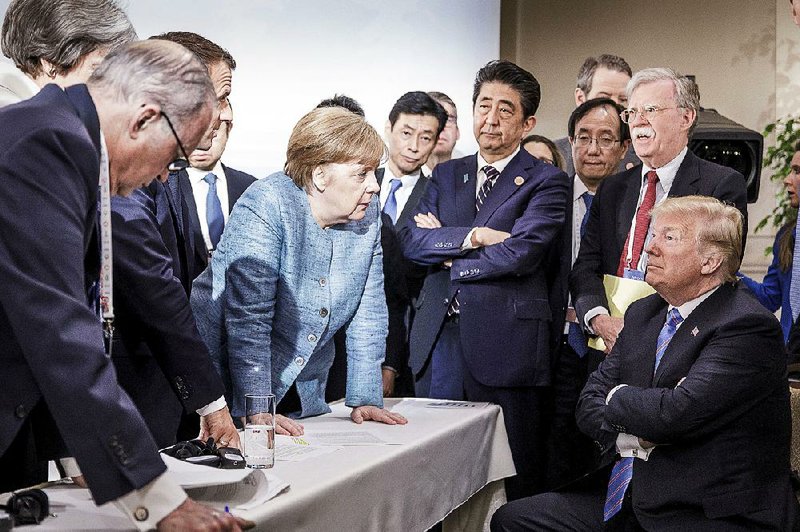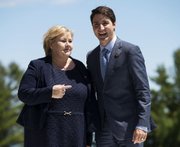LA MALBAIE, Quebec -- President Donald Trump threw the G-7 summit into disarray Saturday, saying on Twitter that the U.S. was pulling back its endorsement of the group's communique in part because of what he called Canadian Prime Minister Justin Trudeau's "false statements" at a news conference.
Trump's tweets from Air Force One, which was flying him to Singapore for this week's summit with North Korea's Kim Jong Un, came just as Canada released the group's official communique, announcing that the seven nations had reached broad agreements on economic and foreign policy goals, but that deep disagreements remained between Trump and the leaders of the other nations, especially on trade.
Trudeau sought to play down personal clashes with Trump as he wrapped up the summit, calling the meeting "very successful" and saying he leaves "inspired by the discussion." But he also pledged to retaliate against the U.S. tariffs on steel and aluminum products in defense of Canadian workers.
In a pair of tweets, Trump lashed out at his G-7 host, accusing Trudeau of being dishonest and weak, and contending that Canada had taken advantage of U.S. interests.
"Based on Justin's false statements at his news conference, and the fact that Canada is charging massive Tariffs to our U.S. farmers, workers and companies, I have instructed our U.S. Reps not to endorse the Communique as we look at Tariffs on automobiles flooding the U.S. Market!" the president tweeted.
He followed up by tweeting: "PM Justin Trudeau of Canada acted so meek and mild during our G7 meetings only to give a news conference after I left saying that, "US Tariffs were kind of insulting" and he "will not be pushed around." Very dishonest & weak. Our Tariffs are in response to his of 270% on dairy!"
A few hours earlier, Trudeau sharply criticized Trump's tariffs and promised that Canada would answer with its own on July 1 unless the United States reversed course.
"Canadians, we're polite, we're reasonable, but we also will not be pushed around," Trudeau said at a news conference.
"I highlighted directly to the president that Canadians did not take it lightly that the United States has moved forward with significant tariffs on our steel and aluminum industry," Trudeau said at a news conference at the meeting's end. "Particularly, [they] did not take lightly that it's for a national security reason that for Canadians ... who stood shoulder to shoulder with American soldiers in far off lands in conflicts from the first World War onwards, it's kind of insulting."
Trudeau had also told reporters that all seven leaders had come together to sign the joint declaration.
In a statement, a spokesman for Trudeau did not address Trump's tweets. "We are focused on everything we accomplished here at the #G7 summit," spokesman Cameron Ahmad said. "The Prime Minister said nothing he hasn't said before -- both in public, and in private conversations with the President."
Earlier Saturday while speaking at a news conference in Quebec, Trump warned allies to make major concessions or risk being cut off entirely from trade with the United States, arguing that they had taken advantage of previous U.S. administrations to rig the global system against U.S. interests.
"We're like the piggy bank that everybody is robbing," Trump said at the news conference. "And that ends."
But foreign leaders publicly and pointedly rejected Trump's demands, raising the possibility of further escalation -- particularly after Trump recently imposed tariffs on steel and aluminum from the European Union, Canada and Mexico, and said doing so protected U.S. national security.
Trudeau said he reiterated to Trump that tariffs will harm industries and workers on both sides of the U.S.-Canada border. He said unleashing retaliatory measures "is not something I relish doing" but that he wouldn't hesitate to do so because "I will always protect Canadian workers and Canadian interests."
Trump cautioned other nations -- those in the G-7 and around the world -- that the size of the U.S. economy means other nations can't win a trade war. "We win that war a thousand times out of a thousand," Trump said.
Representatives from other G-7 countries said they felt as though they had made progress in conveying their positions to Trump, something many of them felt pressured to do by voters at home.
Despite the tension at the summit, the member states' leaders were cordial in person, Trump included. He made first-name references to "Angela" and "Justin," and he repeatedly insisted that he blamed previous U.S. leaders, not foreign ones, for what he sees as the global trade imbalance.
"I blame our leaders," Trump said. "In fact, I congratulate the leaders of other countries for so crazily being able to make these trade deals that were so good for their country and so bad for the United States. But those days are over."
Trump said some of the other leaders he met with during the G-7 summit appeared to admit that their trade arrangements with the United States were unfair.
"A lot of these countries actually smile at me when I'm talking," he said. "And the smile is, 'We couldn't believe we got away with it.' That's the smile."
THE RUSSIA QUESTION
In addition to trade, Trump took questions Saturday about his call for Russia to be reinstated as a member of the G-7 nations.
"I would rather see Russia in the G-8 as opposed to the G-7," he said. "I would say that the G-8 is a more meaningful group than the G-7. Absolutely."
Trump said the leaders discussed the question of Russia's inclusion in the group but reached no conclusion. "We didn't do votes or anything, but it has been discussed," he said.
Trudeau said he told Trump that readmitting Russia "is not something that we are even remotely looking at at this time."
Russia is a permanent member of the U.N. Security Council and plays a significant role in international security issues. It also holds a seat in the larger Group of 20.
"We're looking for peace in the world. We're not looking to play games," Trump added.
Trump is not the first politician to make the realpolitik argument that Russia belongs at the G-7 table, but his position is a complete turnabout from former President Barack Obama's administration, which condemned Russia's 2014 annexation of Crimea and imposed sanctions on Russia as punishment.
"Crimea was let go during the Obama administration, and, you know, Obama can say all he wants, but he allowed Russia to take Crimea. I might have had a very different" response, Trump said.
Leaders from Canada and the U.K. rejected Trump's call to let Russia back in, saying Russian President Vladimir Putin would have to make major changes to be welcomed back. New Italian Prime Minister Guiseppe Conte sided with Trump.
U.S. intelligence agencies have said they have "high confidence" that Russia interfered in the 2016 presidential election, and part of this year's G-7 summit was supposed to focus on protecting democracies from foreign meddling. Special counsel Robert Mueller is investigating Russian interference efforts, including whether Trump's campaign colluded in any way with Russian officials.
G-7 members met in part to discuss how to prevent election interference, and many remain angry over Putin's actions in the Ukraine.
At his news conference, Trump first referred to the Crimean annexation only obliquely.
"Something happened awhile ago where Russia is no longer in," he said. "I think it would be good to have Russia back in."
Trump on Saturday also cited progress on reaching an agreement on the North American Free Trade Agreement with Canada and Mexico, saying the final outcome would lead either to an improved trade deal or separate pacts with the two U.S. neighbors. Trump said he was discussing two types of sunset provisions in which any of the countries could leave the deal. A Canadian official said the leaders discussed accelerating the pace of the talks.
Any NAFTA deal will have a sunset provision of some kind, Trump said, though he indicated that some people are pushing against a five-year time frame. "We're pretty close on the sunset division," he said.
But Trudeau objected strenuously to a sunset clause of any length. "If you put an expiry date on any trade deal, that's not a trade deal. That's our unequivocal position," he said.
Trump signaled that his NAFTA partners would pay a bigger price if there's no agreement.
"If a deal isn't made, that would be a very bad thing for Canada and it would be a very bad thing for Mexico," Trump said. "For the United States, frankly, it would be a good thing. But I'm not looking to do that. I'm not looking to play that game."
Information for this article was contributed by Damian Paletta and Anne Gearan of The Washington Post; by Michael D. Shear and Catherine Porter of The New York Times; by Catherine Lucey, Rob Gillies, Ken Thomas, Jill Colvin, Darlene Superville and Sylvie Corbet of The Associated Press; and by Josh Wingrove, Toluse Olorunnipa and Jennifer Epstein of Bloomberg News.
A Section on 06/10/2018


